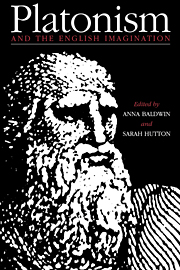Book contents
- Frontmatter
- Contents
- Notes on contributors
- Preface
- I ANTIQUITY
- II THE EARLY CHRISTIAN PERIOD AND THE MIDDLE AGES
- III THE RENAISSANCE AND THE SEVENTEENTH CENTURY
- IV THE EIGHTEENTH CENTURY
- V THE NINETEENTH CENTURY
- 18 Introduction
- 19 Recollection and Recovery: Coleridge's Platonism
- 20 Wordsworth's Ode on the Intimations of Immortality
- 21 Shelley, Plato and the political imagination
- 22 Arnold, Plato, Socrates
- 23 Flux, rest and number: Pater's Plato
- VI THE TWENTIETH CENTURY
- Bibliography
- Index
18 - Introduction
Published online by Cambridge University Press: 15 December 2009
- Frontmatter
- Contents
- Notes on contributors
- Preface
- I ANTIQUITY
- II THE EARLY CHRISTIAN PERIOD AND THE MIDDLE AGES
- III THE RENAISSANCE AND THE SEVENTEENTH CENTURY
- IV THE EIGHTEENTH CENTURY
- V THE NINETEENTH CENTURY
- 18 Introduction
- 19 Recollection and Recovery: Coleridge's Platonism
- 20 Wordsworth's Ode on the Intimations of Immortality
- 21 Shelley, Plato and the political imagination
- 22 Arnold, Plato, Socrates
- 23 Flux, rest and number: Pater's Plato
- VI THE TWENTIETH CENTURY
- Bibliography
- Index
Summary
‘Aristotle is dead, but Plato is alive’ – so Benjamin Jowett (1817–93) used to say. A man is not on oath in an epigram, but it may still be worth asking why Jowett should have said it and his pupils remembered it. He cannot have meant that Oxford undergraduates ignored Aristotle (most of them, throughout the nineteenth century, studied the Ethics), or that scholars were neglecting him (one might think of Grote and Alexander Grant), and it is unlikely that Jowett thought him of small intrinsic value. Rather he felt (as one can see from his private notebooks) that Plato could still aid the moral life of a Christian in the nineteenth century and, more generally, that Plato was a creative influence on the cultural and intellectual life of the age. That belief seems justified. Grote's Plato and the Other Companions of Socrates (1865) was a sign of the times, notable in that a radical and utilitarian, hostile to much of Plato's thought, believed it worth his while to engage with the philosopher, sifting those parts of his work which he considered of permanent value from those which were to be rejected. Jowett for his part translated all Plato's dialogues, providing them with extended introductions which sought to bring out their usefulness for the modern world; his own work not only reflected Plato's continuing influence but helped to sustain it.
It had not been ever thus. As Pat Rogers indicates (see above, pp. 181–5), for much of the eighteenth century Plato was rather neglected (Aristotle too, for that matter).
- Type
- Chapter
- Information
- Platonism and the English Imagination , pp. 201 - 206Publisher: Cambridge University PressPrint publication year: 1994
- 2
- Cited by



